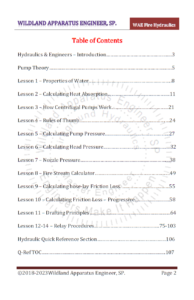Updated for – 2024
Consultation and/or Field Training Services are billed based on the type of training needed because the needs of instruction or consultation will vary widely by agency or person. Every part of the country has slightly different needs, different criteria, have different equipment capabilities and configurations and all of this is taken into account to serve you.
The training WAE provides is not for beginners in Fire Ground and pump Hydraulics, however, WAE can accommodate a wide range of skill sets from those that would be considered basic to more experienced.
The difference between a standard ENOP course and a WAE course is three parts. 1. The hydraulics units WAE provides instruction for are substantially more detailed and involved. 2. The standard ENOP course is designed to only train folks on how to OPERATE the equipment. Outside of simply showing PowerPoints and giving a verbal overview, there is no actual field training in the various pumping operation setups, tactics, and field use. 3. The ENOP program was Designed for Federal Resources only (even though any other agency or contractor may adopt) thus several parts within the course do not apply to contract, state or county resources. The course Wildland Apparatus Engineers, SP has developed is to train folks on just what the title implies, how to become an actual Wildland Apparatus Engineer and involves a lot more than simply knowing how to start your pump.
You are trained on how to survey the topography, determine the best course of action based on the tactical objectives (T.O.) first, and then design a hydraulic supply infrastructure system that best fits the T.O.’s needs. Then design any tender shuttle relay operations, or design and set up remote helicopter dip sites or handle remote SEAT bases where water is not available and you need to bring it in and how to provide the infrastructure so the operation can operate nonstop successfully. You are trained to facilitate pumping operations that would be able to span tens of thousands of feet in distance or more and handle any elevation problems you may encounter. You are trained to think a certain way so when any complex problem is handed off to you, not only will you be able to develop a solution, but you can design a sustainable solution.
Our Course is best suited to a 10-day operational program. This comprises 3 days of classroom (pre-course work, practice scenarios, group and individual exercises, and review where necessary) with 7 days in the field. During the field days period, students are given scenarios for various hose lays such as tandem (not parallel and if the right apparatus is on-site), relay, and series pumping operations and they are allowed to work through the problem and put the training to use to hone their skills. There will also be problems where a scenario will call for an amount of water to handle a certain amount of heat, the engineer will be trained to determine how much water that is. Apparatus Engineers have Operational duties and the only way to gain confidence and experience is to spend time in the field conducting live design and pumping operations.
The course is best suited for those Contract, County, and/or State agencies that have more than one engine or apparatus by type that can be plugged into the operation to maximize training benefits. 4 apparatus is the minimum and 5 or 6 are ideal. Being an Apparatus Engineer also means one should know and understand the capabilities of every apparatus on the fire ground. The more one can work with varied apparatus the better their experience (slide shows as we call it) for use later in the actual wildfire environment.
The Course field days portion will include a full complement of Stations. Stations include Drafting: This is a major element of this course and one that many students have severe difficulty with. You will be trained on how to solve issues related to failures of drafting and will learn to draft 100% of the time 100% successfully once you are trained in a proper procedure. Hose lay pump operations: You will be given a scenario in the field and be asked to demonstrate your knowledge of what you have learned by laying out, calculating pressures, locations, and any engine spacing distances for apparatus and determining your resource needs for a field problem. Then you will pump it. Then there will be Series and Progressive hose pumping operations. Then there will be a Tandem Pumping operation. To be proficient one must spend the time practicing their newly learned skills.
It is ideal if agencies of County and or State have multiple apparatuses of varying types that can participate as this brings the entirety of the engineer program to fruition and offers the greatest advantage to students.

If a Agency or Department is looking to have their own Engine Operator program, WAE can assemble a small Cadre that can provide for a full PMS-419 ENOP Program. A Ball Park figure can be supplied via telephone or email.
Email Hydro@wildfireengineer.com today
Please make contact via email or phone to discuss your needs and to either set up a schedule or a possible training plan. Due to rapidly fluctuating costs of business, fuel, transportation etc. A fixed price can no longer be listed here. Please call or email us for your needs or for a quote.
Training rates would include any Travel Expenses.
All Training / Consulting is done by Appointment Only. And will exceed NWCG standards.
